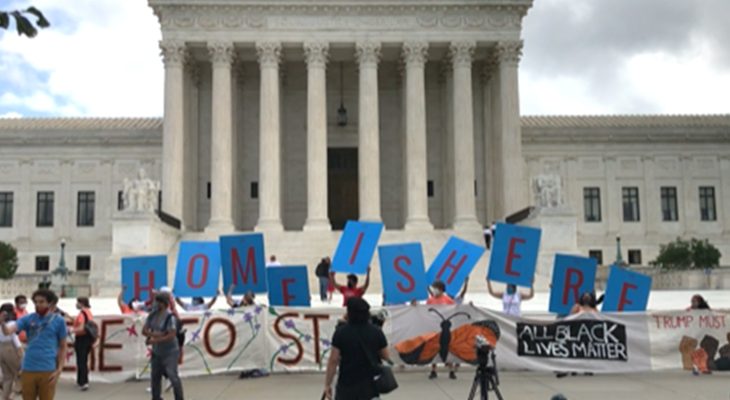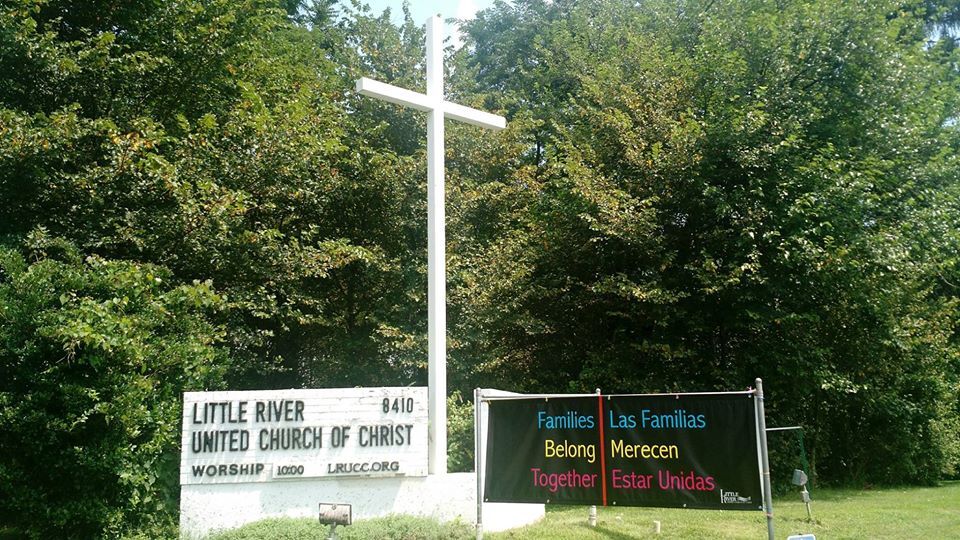Home is Here . . . for now
July 1, 2020

Rev. Alexis Vaughan Kassim is the pastor of Little River United Church of Christ in Annandale, VA. A longtime IFYC alum, Alexis currently participates in the Faith/Secular Leaders alumni cohort and was previously awarded the One Chicago, One Nation grant and Germanacos fellowship. Her church interests include advocacy and activism, and asking the question “who will we be to one another and to God?” Her non-church interests include watching television, tennis, and all things Duke basketball. You can find her on IG @REVolutionlovejoy.
I never wanted to be the kind of person who didn’t believe in miracles. That would be bad in my line of work. As a pastor who works closely with the Congregation Action Network, an interfaith organization dedicated to deportation defense and solidarity with immigrants, I have been praying for many miracles over the last few years. My church sits directly across the street from Northern Virginia Community College, one of the most internationally diverse colleges in the United States, with a student body representing over 180 countries. Many of these students are Dreamers or recipients of the Deferred Action for Childhood Arrivals program.
I’ll never forget the day Val came to my office nearly two years ago. Having seen the “Families Belong Together” banner in front of my church as she was leaving the school’s parking lot, she stopped in to ask me to pray for her. She had just submitted her DACA renewal application and was nervous that it might be rejected given the current political climate. She told me that she comes from a long line of chefs and that her grandparents, originally from Tijuana, Mexico, had owned several bakeries there and California. Back in those days, people like her grandparents crossed the border all the time for business and never thought of it as leaving one home for another. They never considered themselves at home in Mexico and strangers in California. After we prayed together, I asked her if there was anything else she needed. “Just keep praying for a miracle,” she said and left.
Share
Related Articles

I never saw Val after that encounter, but I thought about her on June 18th when in a 5-4 decision, the U.S. Supreme Court ruled that the Trump administration cannot immediately end the Deferred Action for Childhood Arrivals (DACA) program. Like with Val, DACA has lifted the lives of more than 700,000 Dreamers since 2012, enabling them to step out of the shadows long enough to work and pursue their educations in the only home most have ever known. While this ruling is great news, it is not yet a permanent solution for DACA recipients. Only legislation by Congress, such as the American Dream and Promise Act passed a year ago by the House, but not yet taken up by the Senate, could make protections for DACA recipients permanent.
This decision may not have been the ultimate miracle that would have enabled DACA recipients to live completely out of the shadows, but it still was a win that deserved to be celebrated! Later that evening, members of the Congregation Action Network hosted a Zoom party for DACA advocates to share our reactions, but our celebrations were short-lived. One of our lawyers reminded us that the Supreme Court decided to uphold DACA because the move to end the program was deemed “arbitrary and capricious.” This decision came from an understanding that the administration’s procedure to end DACA was wrong, not the moral judgments guiding it. “They will try again,” the lawyer told us, “now we need to talk about shifting our strategy to face the next battle.”
At that moment I remember thinking how hard it is to hold onto a moment of joy these days. As a black woman in a mixed-status family, I am always in survival mode. I immerse myself in justice work because my life and my family members’ lives literally depend on it, but it is exhausting. Still, working in multireligious contexts has allowed me to embrace a better vision for the world even amid feelings of despair. An imam on the call provided a helpful framework for holding the tension between joy and despair when we are tired of struggling. He said that unlike Christianity, in Islam you would not necessarily pray for God to be just in a given situation, you would pray for God to be merciful. He went on to explain that if God is truly just, we would all then suffer consequences of the times in our lives when we have fallen short of loving our neighbors as commanded. We would all suffer the consequences of the times in which we have ignored people living on the margins and in the shadows. But if God is merciful, we are given another chance that we have not earned to be better to one another. That is the true miracle!
I’ve never stopped believing in miracles, but now when I pray for them, I am really asking for God to be merciful so that we all have another chance to do our part in making the world more just. The Supreme Court victory on DACA was nothing short of a miracle in that sense. We can take a moment to breathe and celebrate this win, but the struggle continues for a permanent solution. Thankfully, God is still working. God is still merciful, and we have been given another chance to be better to one another.



